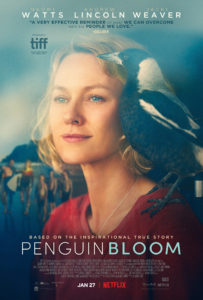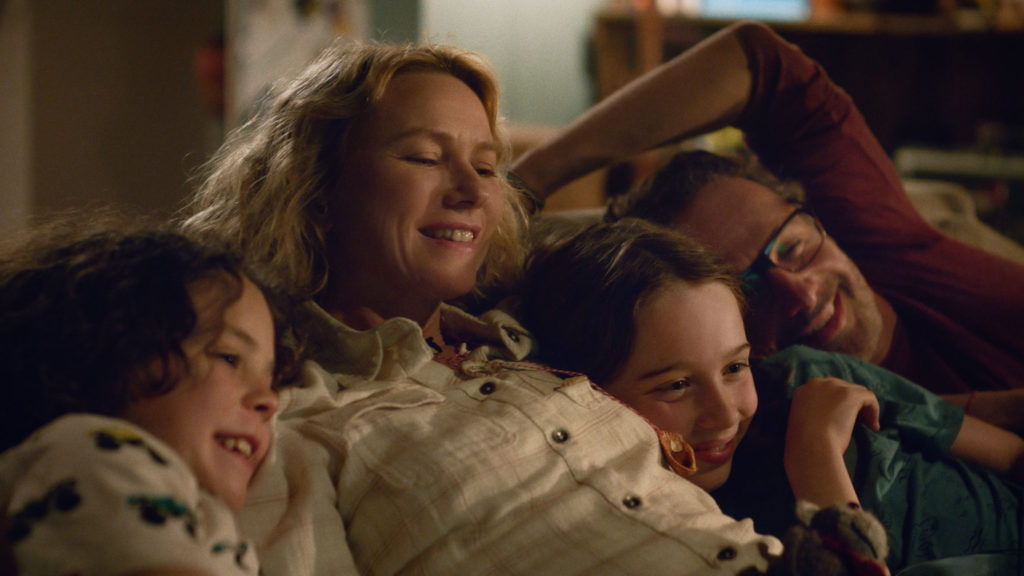Review by David Baldwin

The Blooms were an adventurous family who loved spending time outdoors. That changes in an instant during a trip to Thailand when Sam Bloom (Naomi Watts) falls from a platform in a freak accident, breaks her back and becomes paralyzed from the waist down. While Sam and the family learn to cope and understand her new disability, they take in an injured magpie they affectionately name Penguin, or Peng for short. While this new member of the family is initially a burden on Sam, it slowly starts to aid in her recovery.
Penguin Bloom is an inspiring true story that would have really flourished if it were able to have a flashy physical premiere at last fall’s Toronto International Film Festival. The cast would have attended, and the real life Bloom family would have been there too. I can practically feel the energy and thunderous standing applause at the Princess of Wales when the real Sam Bloom wheeled herself out on stage. It would have been a triumphant and vividly emotional moment. Covid robbed us of that, and instead it premiered online and in sparsely attended Lightbox screenings because the festival was only able to sell a set number of seats to each screening. A far cry from the days of 2000+ people crammed in at Princess.
I missed Penguin Bloom at the festival and ended up watching it on Netflix from the comfort of my living room a week ago. I was safe from Covid, but it was an even further cry from that theoretically triumphant premiere that was never able to happen.

I mention all of this because I feel like I would have enjoyed Penguin Bloom a whole lot more in that large-scale setting. The film is moderately inspiring (going so far as to label the music “inspiring” when watching with captions), the picturesque Australian vistas and lush cinematography are gorgeous to marvel at and Watts is just as spectacular as you have come to expect. She is slightly more subdued than normal, but her character has gone through a horrible trauma and spends much of the film depressed and angry. So it makes sense that she would not be nearly as enthusiastic as some of her other characters.
But everything else about the film just does not feel right, specifically within the editing and what kind of focus the filmmakers want to give to the various aspects of the story. The film is initially narrated by Sam’s eldest son Noah (Griffin Murray-Johnston in his feature debut), who blames himself for the incident that left his mother paralyzed. It is heavy stuff and provides a small smattering of truly devastating work from Murray-Johnston and Watts. Outside of those precious few moments though, the film barely explores Noah’s guilt and all but forgets about him once it settles into the rhythm of focusing on Sam, Peng and their recoveries. Why bother framing the film like this if it is just going to pivot in a whole different direction entirely practically on the fly?
The film forgets about Sam’s other kids too, who get a few cutesy moments with the magpie but are otherwise background figures and nothing more. Even worse, patriarch Cameron (Andrew Lincoln, whose real life counterpart wrote the book the film is based on) has so little to do and react about – he sets a few things into motion for Sam and that’s about it – that you begin to wonder why someone so recognizable was cast in this thankless role in the first place. If the film wants to focus on Sam that is one thing. But from the on-set, it wants to focus on the family unit, what her disability means for all of them and how they are going to move forward with their lives. It just seems to keep tossing aside vital information and forgetting that there are other characters in the movie besides Sam and the magpie.

Speaking of magpies, while I appreciate the amount of effort and time that went into training the animals who portrayed Penguin I need to ask: who was in charge of regulating the magpie(s) squawks and why did they not spend more time on it? The squawks and noises they make are constantly grating, annoying, obnoxious and above everything else, loud. They become a little better in the second act, but they are still the loudest animal noises I think I might have ever heard in a major motion picture. And if anyone knows how they managed to pull off the shots of Penguin fighting other birds, I would love to hear the stories.
I wanted to love Penguin Bloom. I really did. Watts is great, the look is fabulous and there are a few truly wonderful and inspiring moments sprinkled throughout the film. But it does not seem to know what kind of story it wants to tell, and keeps forgetting about key characters that should be a whole lot more important in the grand story. I really feel like they made a key mistake changing the framing device, and feel like Murray-Johnston deserved a whole lot better to display the terrific performance that makes up his first acting role. The film is mercifully short, but it could and should have been longer if the framing and focus was tightened and expanded to include more than just Sam and Penguin.
And while I am certain I am not the first to make the connection, after her work here and in her Oscar-nominated role in The Impossible, I fear for the next tragic, harrowing real life tale Naomi Watts gravitates to about another family whose lives are upended and changed irrevocably after a trip to Thailand. Here’s hoping their family’s story is a bit less intense than the ones in The Impossible and in Penguin Bloom.
Penguin Bloom streams on Netflix starting Wednesday January 27, 2021.